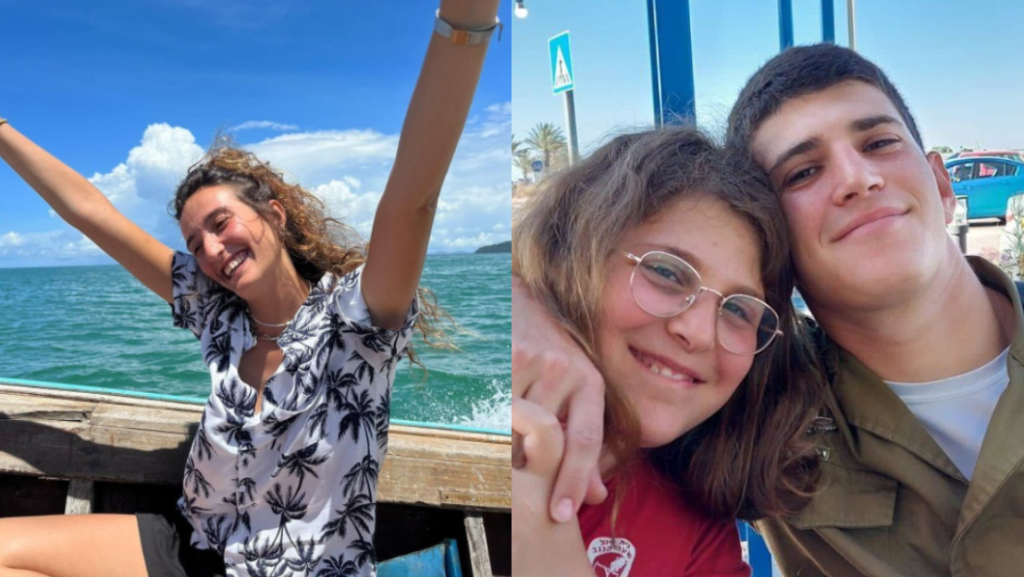Hamas’s attack on Israel: 2 victims with Canadian ties laid to rest

Two victims with ties to Canada who were killed in Hamas’s attacks on Israel were remembered fondly by relatives on Wednesday, who called for the world to recognize the brutality of what happened.
Tiferet Lapidot, 22, was formally identified by authorities on Monday, more than a week after she died at a music festival near the Gaza Strip border, where Hamas’s attack began on Oct. 7. Her family had thought she was among those being held hostage.
“She was like a daughter for me,” said Harel Lapidot, her uncle. “And the funeral was horrible, the taking (of) a happy girl, helping, loving.”
Advertisement
Tiferet Lapidot was an Israeli citizen whose father has roots in Saskatchewan. In an interview Wednesday, a Montreal-based relative described Lapidot as charismatic and compassionate.
Oran Zlotnik said Lapidot had taught in Africa and had lived in Australia. Zlotnik said she had returned to Israel for the holidays and was a few days shy of her 23rd birthday.
“She was in contact with her mother, so her mother got a phone call toward the end of this festival when she told her she was hiding in a bush,” Zlotnik said. “She asked her mom, ‘should I go join other people trying to run away or just stay here in the bush and try to hide?'”
The phone line disconnected and later the family learned the phone signal had been tracked to the Gaza Strip.
“We sort of had to work under the assumption that she’s there because if she’s there and we’re doing nothing, it would be horrible,” Zlotnik said.
Advertisement
Zlotnik said that when the cellphone of one of Lapidot’s friend’s, confirmed deceased, was also traced to Gaza, the family realized it was possible she wasn’t a hostage.
For Harel Lapidot, what happened to his niece evoked memories of the Holocaust.
“We know for a fact that they were hunted,” Lapidot said. “They ran away and they were hunted and killed.”
Harel Lapidot, a Canadian citizen, thanked the Jewish community in Canada and MPs who had reached out to help and offer support. The family had a meeting with Foreign Affairs Minister Mélanie Joly while she was in Israel.
“They didn’t know us, but they helped us, and I’m proud to be the Canadian and proud to be a Jewish Canadian,” he said.
Advertisement
Netta Epstein, 21, was killed when Kibbutz Kfar Aza, his community just a few kilometres east of the Gaza Strip, came under attack 11 days ago. He was the eldest of Ayelet Shachar-Epstein’s three children.
“Netta was a very easy-going, life-loving type of person,” Shachar-Epstein said, describing him as an exceptional soccer goalie who had volunteered at a home for kids with special needs. He completed his mandatory military service just two months ago, spending the majority of it in combat, she said.
Since his death, many of those he met throughout his young life have reached out to the family to pay tribute to him.
“He was a guy that loved living,” Shachar-Epstein said. “He was happy to be alive.”
She learned the circumstances of his death from texts messages he had sent her in the moments before he was killed, and from his fiancée, Irene Shavit, who survived. They had been a couple for 18 months and had plans to marry.
Advertisement
Netta Epstein was inside a safe room with Shavit; he jumped on a grenade thrown in by the attackers.
“She witnessed this horror and she did survive,” Shachar-Epstein said.
Epstein was Canadian through his maternal grandmother, who was born in Montreal in 1948. Many extended family members still live in the city.
Shachar-Epstein lost five family members in the early morning attack on Oct. 7. In addition to her son, her mother-in-law and two brothers-in-law were killed. A fifth family member — a nephew — is missing.
She lived in the same community as Netta: Kibbutz Kfar Aza. On the day of the attack, her father-in-law called to say his wife had fallen in the kibbutz. Shachar-Epstein said she didn’t realize the danger at the time and went over to see what had happened.
Advertisement
“I ran there to help her later on. It was only later on when I understood that what I did was really very dangerous because there were terrorists everywhere,” Shachar-Epstein said. “I did not imagine we would see her dead on her porch, shot cold-blooded, murdered by a rifle, the remnants of the bullet was right next to her.”
For Netta’s funeral on Tuesday, Shachar-Epstein said she read from a letter she wrote to him during the 27 hours she spent in a safe room with her father-in-law, knowing her son was dead.
“It was kind of a diary, and at his funeral that’s what I read.”
Shachar-Epstein said it’s important that the world knows the extent of the brutal attack on her country.
“It’s really important for me to tell the world these stories so people understand we were not standing in front of them and shooting, we were sleeping in our beds.”